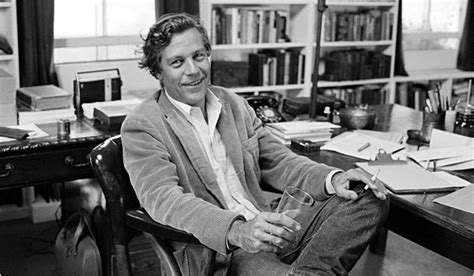A Quote by Henry Miller
He is trying to recapture his innocence, yet all he succeeds in doing (by writing) is to inoculate the world with a virus of his disillusionment.
Related Quotes
A man writes to throw off the poison which he has accumulated because of his false way of life. He is trying to recapture his innocence, yet all he succeeds in doing (by writing) is to inoculate the world with a virus of his disillusionment. No man would set a word down on paper if he had the courage to live out what he believed in.
Writing itself, if not misunderstood and abused, becomes a way of empowering the writing self. It converts anger and disappointment into deliberate and durable aggression, the writer's main source of energy. It converts sorrow and self-pity into empathy, the writer's main means of relating to otherness. Similarly, his wounded innocence turns into irony, his silliness into wit, his guilt into judgment, his oddness into originality, his perverseness into his stinger.
If you saw Atlas, the giant who holds the world on his shoulders, if you saw that he stood, blood running down his chest, his knees buckling, his arms trembling but still trying to hold the world aloft with the last of his strength, and the greater his effort the heavier the world bore down upon his shoulders - What would you tell him?" I…don't know. What…could he do? What would you tell him?" To shrug.
The translator ... Peculiar outcast, ghost in the world of literature, recreating in another form something already created, creating and not creating, writing words that are his own and not his own, writing a work not original to him, composing with utmost pains and without recognition of his pains or the fact that the composition really is his own.
The master in the art of living makes little distinction between his work and his play, his labor and his leisure, his mind and his body, his information and his recreation, his love and his religion. He hardly knows which is which. He simply pursues his vision of excellence at whatever he does, leaving others to decide whether he is working or playing. To him he's always doing both.
Anytime you adapt work of somebody who you respect, as much as I respect him, it's an enormous responsibility. In honoring that responsibility, what we try to do is to continually use his work, and the writing that he did about his life and his work, as our guide. That starts with his intent for what he was trying to express when he wrote it, and it extends to his intent overall.
Kafka is one of my very favorite writers. Kafka's fictional world is already so complete that trying to follow in his steps is not just pointless, but quite risky, too. What I see myself doing, rather, is writing novels where, in my own way, I dismantle the fictional world of Kafka that itself dismantled the existing novelistic system.
For it is not possible to join serpentine wisdom with columbine innocence, except men know exactly all the conditions of the serpent: his baseness and going upon his belly, his volubility and lubricity, his envy and sting, and the rest; that is, all forms and natures of evil: for without this, virtue lieth open and unfenced.
Dantes passed through all the stages of torture natural to prisoners in suspense. He was sustained at first by that pride of conscious innocence which is the sequence to hope; then he began to doubt his own innocence, which justified in some measure the governor's belief in his mental alienation; and then, relaxing his sentiment of pride, he addressed his supplications, not to God, but to man. God is always the last resource. Unfortunates, who ought to begin with God, do not have any hope in him till they have exhausted all other means of deliverance.





































